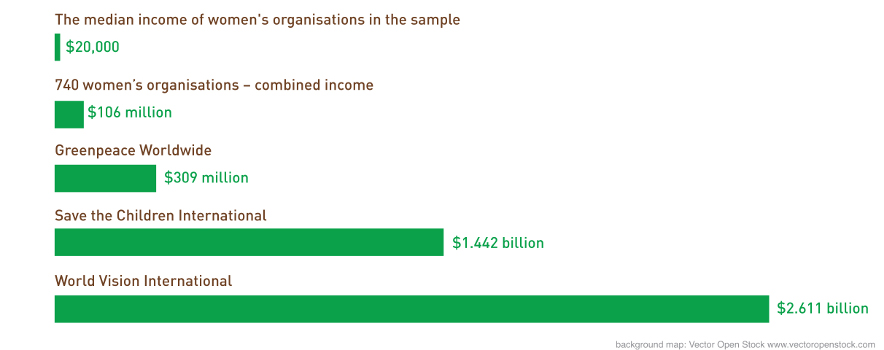Funding for women living with HIV is vital to implement WHO’s Consolidated Guideline on Sexual and Reproductive Health and Rights of Women living with HIV. This is recognised in the checklist for community engagement to implement the guideline, which calls on key donor partners to ‘support organisations and networks of women living with HIV, especially those from key affected populations, who are struggling to access funding for the important work we are doing.’
However, when some of us were involved in recording Salamander Trust’s podcast The WHAVE, the lack of funding for the work of organisations and networks of women living with HIV was one of the key things that came up, time and again, in every episode. Women contributors in Latin America, Asia, Africa, Europe, the Caribbean were all saying that their organisations were not adequately funded, their activism not supported, their advocacy and peer support work unpaid.
‘Funding has just been such a huge frustration to be honest. We spend hours applying for funding every year, every year it’s a struggle, and it’s enough funding only to achieve the barest minimum.’ (Longret Kwardem, UK)
‘In our context, funding is scarce, funding is like the tears of dogs, we do not even find it.’ (Francine Nganhale, Cameroon)
‘Sadly, we don’t receive enough funding for this. People think theatre is nothing much, no impact. But they are wrong.’ (Rahayu Rahmat, Malaysia)
I do all this because I believe in it, because I think it’s important, and because nobody else is doing it here. There is not much funding – if we have some, we can provide refreshments … But many times I just do it with what I have.’ (L’Orangelis Thomas, Puerto Rico)
The WHAVE contributors documented all the ways they were challenged by funding, and the impact of this on their work, which you can read in the Salamander Trust brief on funding for women’s rights organisations. Salamander Trust published this brief in May 2020. As it was being written, an article appeared in the Philanthropist that reported that ‘only about 0.5% of international aid earmarked for gender equality goes to women’s rights organisations, according to the OECD’.
We kept reading this phrase and thinking it must be a mistake. How could it possibly be correct, when there is sound evidence to show that progress towards gender equality absolutely depends on a strong and vibrant women’s movement and local women’s organising. So we looked at the OECD charts on donor aid – and we were shocked to find it’s true.
The OECD reports that only 0.5% of international aid earmarked for gender equality actually reaches southern-based women’s rights organisations (OECD/DAC Network on Gender Equality (GENDERNET), 2016) and its charts show that only 1% reaches women’s rights organisations globally (OECD/DAC, 2019).
These OECD figures explain why we are all feeling so underfunded. It’s not just our individual organisations – it’s systemic inequality, huge power differentials, massive concentration of wealth and very little redistribution. When our organisations and our work is so underfunded, it’s no surprise that gender inequality remains entrenched, women continue to do huge amounts of unpaid work, and violence against women and girls continues to rise, particularly in the Covid-19 lockdown and curfew.
This has been going on for a long time. In 2010, a study by the Association of Women in Development (AWID) found that the median budget for 740 women’s organisations all over the globe was ‘a miserly US$20,000’. The graph below compares the income of these women’s rights organisations with a selection of large international organisations.

It’s shocking, really shocking. We are grateful to the author of the Philanthropist article, Joanna Pachner, for her work to highlight it, to AWID and the feminist funders who are working to change this, and to all the women living with HIV who have raised funding as a key issue. If you also want to shout about it, do use the references at the bottom of this article. And we hope you will join us at the virtual Women’s Networking Zone which is part of the AIDS2020 Global Village, when we will be discussing these issues and challenges around funding on July 8, 2020, at 8h EST, 13h BST, 15h EAT.
Lucy Wanjiku Njenga, Positive Young Women Voices (Kenya): @LucyWanjikuN, @GirlsWomenPower
Longret Kwardem, 4M Mentor Mothers Network (UK): @4MProject, @SalamanderTrust
Martha Tholanah, Community advocate/activist, Making Waves (Zimbabwe): @MARTHOLANAH, @MakingWavesNet
Maria Okwoli, Global Women’s Health Rights and Empowerment Initiative (Nigeria): @MariaOBenjamin1, @G_whrei, @nigeriaSwa
Useful references on funding for women’s and girls’ rights organisations:
- OECD/DAC Network on Gender Equality (GENDERNET) (2016) Donor support to southern women’s rights organisations: OECD Findingshttps://www.oecd.org/dac/gender-development/OECD-report-on-womens-rights-organisations.pdf
- OECD/DAC (2019) Aid in Support of Gender Equality and Women’s Empowerment; Donor Charts https://www.oecd.org/dac/financing-sustainable-development/development-finance-topics/Aid-to-gender-equality-donor-charts-2019.pdf
- Pachner, J. (2020) COVID-19’s Disproportionate Impact on Women Raises Tough Questions for a Philanthropic Community Wary of Applying a Gender Lens to its Investments. The Philanthropisthttps://thephilanthropist.ca/2020/05/covid-19s-dispropportionate-impact-on-women-raises-tough-questions-for-a-philanthropic-community-wary-of-applying-a-gender-lens-to-its-investments/

